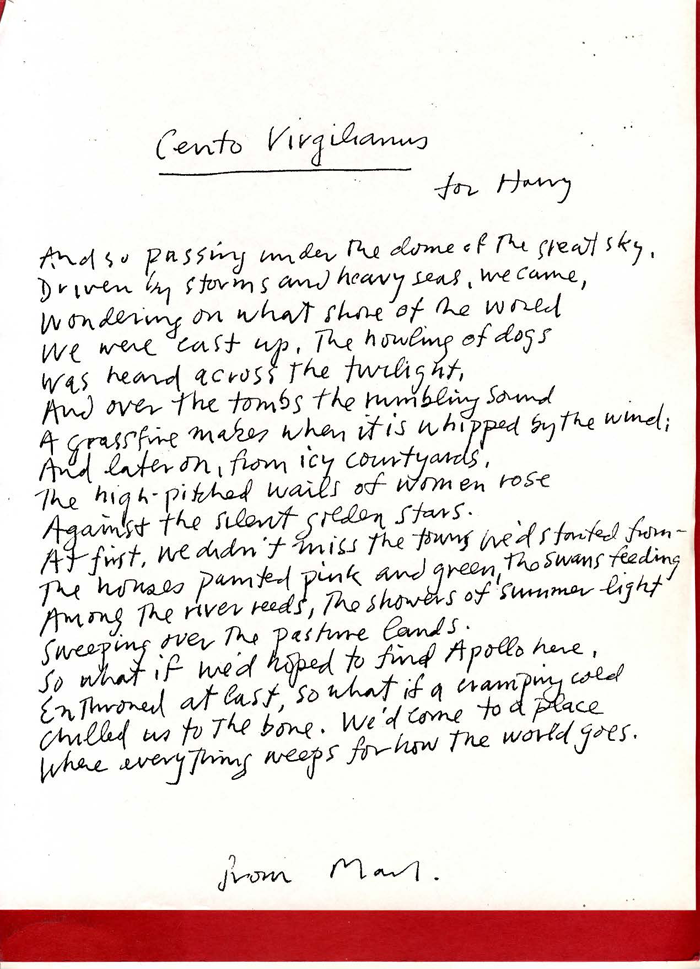
This 1987 archival document comes from Mark Strand, who sent this handwritten poem to Henri Cole, who then served as executive director of the Academy of American Poets.
In September 1987, Cole asked Strand to “write out a poem to be included in the folio for Mr. [Harry] Ford,” as the Academy was planning a commemorative event for Ford, called A Poets’ Salute to Harry Ford, at the Guggenheim Museum in New York City on November 3, 1987. Ford, who was known as one of the nation’s leading poetry editors at the time, worked for several years at Atheneum and Alfred A. Knopf, where he edited the work of poets like Langston Hughes, James Merrill, W. S. Merwin, Wallace Stevens, and Strand.
Strand felt particularly indebted to Ford, who published his second book, Reasons for Moving, in 1968, and with that, kick-started Strand’s literary career. Strand himself said, “I owe my professional career as a poet to Harry Ford.” In fact, when Ford left his post at Alfred A. Knopf for a position at Atheneum, Strand followed him, and Atheneum went on to publish Strand’s next three collections, Darker (1970), The Story of Our Lives (1973), and The Late Hour (1978).
Strand’s poem “Cento Virgilianus” refers to a late classical form of poetry composed exclusively of quotations from Virgil. “And so, passing under the dome of the great sky, / Driven by storms and heavy seas, we came, / Wondering on what shore of the world / We were cast up” the poem begins, spoken in the voice of one of the members of Aeneas’s crew. Set in the middle of the action, as the crew has arrived at some vague location, the poem indulges in lush imagery and sonic descriptions to create a visceral experience of this journeying with the “howling of dogs,” the sound of the grassfire being “whipped by the wind,” and the “high-pitched wails of women.” Ironically, this poem came to Strand during a period of inactivity in his poetry. “I gave up [writing poems] that year,” he said. “I didn’t like what I was writing; I didn’t believe in my autobiographical poems.” For five years, he focused on journalism and art criticism instead, until he became inspired by Virgil’s seminal work. “In 1985, I read Robert Fitzgerald’s translation of The Aeneid,” Strand said. “I decided I’d try a poem, and I wrote ‘Cento Virgilianus,’ and I was off and running.” The poem later appeared in The Continuous Life, Strand’s first book of poem in ten years.
Strand, who was joined at the event by fellow poets Marvin Bell, Peter Davison, Donald Finkel, Anthony Hecht, John Hollander, Donald Justice, Philip Levine, James Merrill, W. S. Merwin, John N. Morris, and Mona Van Duyn, had recently received a MacArthur Fellowship, and his book The Continuous Life would follow less than three years later.
